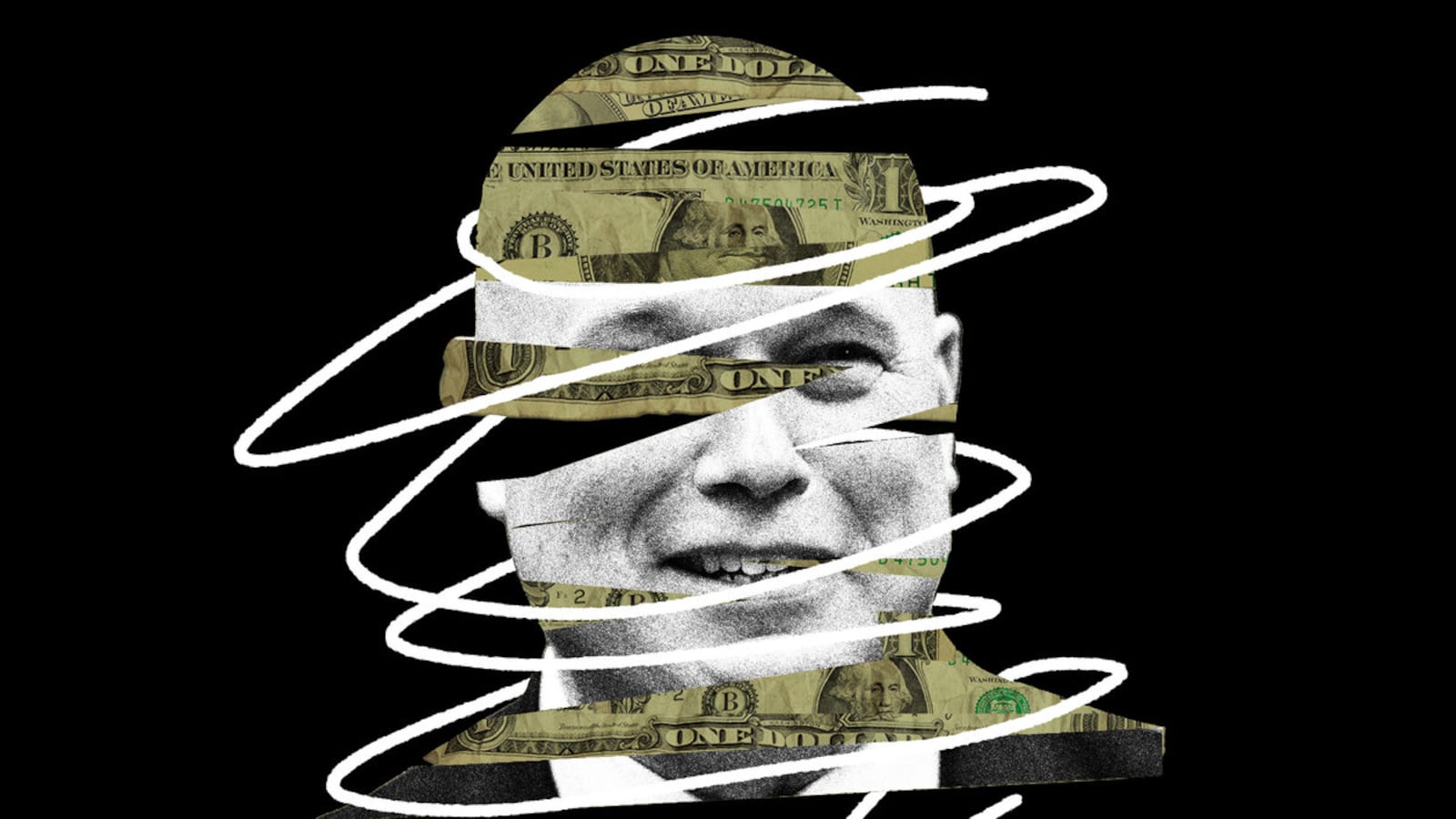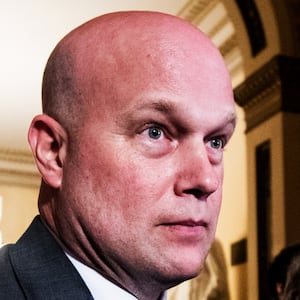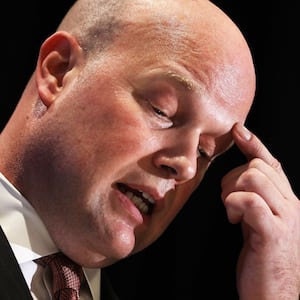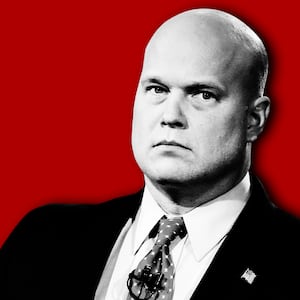In Donald Trump’s final months in office, lobbyists swarmed the White House in hopes of securing pardons for their clients. It was a cash bonanza for Beltway insiders aspiring to bend the aggrieved president’s ear, as disclosures required by federal law later revealed.
But one person stands out among that crowd, both for his former role in the Trump administration and for the fact that he never registered as a lobbyist—even though he was being paid $400,000 by a conservative “dark money” group that had tapped him to lead its efforts to secure pardons and commutations.
Matthew Whitaker held senior roles in Trump’s Justice Department from September 2017 to February 2019, finishing off his DOJ tenure with a three-month stint as the acting attorney general. And when he finally departed the administration, he found quite the cushy gig: chairing a new project for the right-wing nonprofit FreedomWorks.
The group brought Whitaker on in March 2020 to head up its new “American Freedom Initiative,” which FreedomWorks claimed “aims to recommend deserving individuals to the Trump administration for pardons and commutations.” A previously unreported federal filing from FreedomWorks, which does not have to disclose its donors, shows that the organization paid Whitaker $400,000 last year in unspecified “consulting” fees.
That role raises a number of ethical questions for Whitaker. He was directly involved in White House clemency negotiations possibly as late as Trump’s last full day in office, but never registered as a lobbyist while advocating for pardons—and FreedomWorks never named clemency issues in any of its 2020 lobbying reports.
Still, Whitaker is listed as an advocate in two official announcements—the December clemency granted to convicted health-care fraudster Daniela Gozes-Wagner, and the last-minute conditional pardon extended to Stephen Odzer, who in 2006 pleaded guilty to more than $16 million in bank fraud.
Kedric Payne, senior director of ethics who specializes in lobbying law at nonpartisan watchdog Campaign Legal Center, said the available evidence suggests that “extensive paid lobbying” went unreported.
“Federal law requires disclosure from those who are paid to lobby for pardons,” Payne explained. “This matter raises red flags because there appears to be extensive paid lobbying, but no evidence of lobbying registration. The public has a right to full disclosure about who is lobbying our public officials.”
Paul S. Ryan, vice president of litigation at government watchdog Common Cause, pointed out that the laws surrounding lobbying for pardons specifically are fuzzy, and before Trump’s final months relatively untested. But he also noted that a number of Trump lobbyists saw fit to disclose that work.
“Other lobbyists tied to Trump have reported massive income lobbying the administration for pardons. Any failure by Whitaker to disclose hundreds of thousands of dollars received to lobby the Trump administration warrants close scrutiny,” Ryan told The Daily Beast.
Neither Whitaker nor FreedomWorks replied to requests for comment.
The arrangement also raises questions about Whitaker’s still-fresh relationships to Justice Department officials and Trump himself, who passed over Deputy AG Rod Rosenstein when he gave Whitaker the top job in November 2019.
The appointment was riddled with controversy over its constitutionality and Whitaker’s own qualifications, as well as the influence Trump was trying to exert over Robert Mueller’s special investigation. Whitaker helmed the department through the final stages of the Mueller probe, but his main credentials for that job seemed to be that he had served for two years as chief-of-staff to Trump’s first attorney general, Jeff Sessions.
That tenure actually meant that Whitaker’s time at the DOJ almost perfectly overlapped with the conviction and sentencing in one of his successful clemency bids.
In September 2017, a jury found Daniela Gozes-Wagner guilty of fraud and money laundering for her role in a Russian company’s multimillion-dollar Medicare and Medicaid fraud scheme. Whitaker had been appointed chief-of-staff to Sessions the previous week.
Gozes-Wagner was later sentenced to 20 years in prison and ordered to pay $15.2 million in restitution. It was the harshest punishment in the case, though a number of circumstances complicated the company’s prosecution, including guilty pleas, government cooperation, and an incapacitating suicide attempt. Whitaker left the DOJ two days prior to the sentencing.
Still, it’s unclear whether FreedomWorks itself saw any return on its investment in Whitaker.
According to the group’s website, AFI advocated for clemency on behalf of more than 30 people. Many were women and people of color, and the site lists several convictions related to drug offenses. But the site identifies only three successful applications, and the list does not include Gozes-Wagner or Odzer.
Those three clemencies were also granted before FreedomWorks launched its collaboration with Whitaker. White House records show that Whitaker advocated for all three in his personal capacity, but the clemencies were issued in February 2020, about three weeks before Whitaker officially joined FreedomWorks.
In a March 11 interview announcing the new initiative, FreedomWorks communications director Peter Vicenzi inquired specifically about those three cases, asking Whitaker, “We submitted their names, correct?”
Whitaker did not answer directly, responding, “So AFI—we’re working with many of the other groups in this space.” The White House announcement cited multiple organizations backing those same three candidates, but FreedomWorks and AFI were not among them.
In the announcement video, Whitaker, who a decade prior to accepting the Trump administration post served as an assistant U.S. attorney, pre-empted accusations of hypocrisy. His efforts, he said, were “no way an indictment broadly” of law enforcement officers who “work so hard on these cases and put their lives on the line.”
Some of his former colleagues would appear to disagree. Federal prosecutors called Trump’s generous application of executive clemency—specifically toward health-care fraudsters like Gozes-Wagner—“disheartening, demoralizing” and “an incredible kick in the teeth.”
However, another possible clemency was in the air, and it hit close to home for Whitaker.
Weeks before Whitaker joined AFI, a federal judge had sentenced Trump loyalist Roger Stone to 40 months in prison on convictions for witness tampering and giving false statements.
Whitaker repeatedly took up for Stone, who was indicted on his watch as acting attorney general in January 2019.
Shortly after Stone was taken into custody, Whitaker—in his capacity as acting attorney general—said in sworn congressional testimony that he had been briefed on the decision and repeated a conspiracy theory about the arrest.
Five days before Trump doled out the February 2020 pardons, Whitaker went on Fox News as a private citizen to defend then Attorney General William Barr’s controversial move to reduce the DOJ’s recommended sentence for Stone, which he said was “too serious.”
In that interview on Feb. 13, 2020, Whitaker said the president had “absolutely” done nothing wrong when he suggested Barr should intervene. He also claimed CNN had been “tipped off” to Stone’s arrest, and complained about the jury foreperson’s “bias,” citing prior anti-Trump tweets.
The day after the February pardon spree, Trump tweeted a clip of Tucker Carlson discussing Stone’s sentencing, in which the Fox News personality floated the idea that the president “could end this travesty in an instant with a pardon, and there are indications tonight that he will do that.”
Trump eventually commuted Stone’s sentence in July. Whitaker then once again took to Fox News, pushing back on widespread criticisms of cronyism.
In that interview, Whitaker—who was at the time getting paid to secure clemencies from his former boss—said that Trump “has looked at cases where he feels that a fairness, a fundamental fairness, has not been done and he tries to right those wrongs.” The former top prosecutor added that he “would expect as this president continues to serve in this role that he will grant other pardons, commutations, and other executive clemency as he sees fit.”
At least two of those reprieves would go to applicants Whitaker backed: Gozes-Wagner and Stephen Odzen. However, Odzen’s narrow pardon did not cover his exposure in two ongoing suits, a still-unsettled contract dispute involving PPE for COVID-19, and a $500 million fraud lawsuit the Securities & Exchange Commission brought against a predatory lender. That case prompted the lender to take action against Odzen and several of his companies, which owed a combined $91 million.
By comparison, those numbers tower over the $26 million Whitaker’s own former employer, World Patent Marketing, paid to settle a federal fraud suit in 2018. The Federal Trade Commission shuttered the business for scamming clients hoping to secure patents for their inventions, many of which—such as a “masculine toilet”—were outrageous and stood little chance of success.
Whitaker acted as an attack-dog attorney for the company, and had invoked his status as a former assistant U.S. attorney to lend the operation credibility. The FTC subpoenaed Whitaker’s records in October 2017, weeks after his DOJ appointment under Sessions, but he reportedly did not respond. A court official handling the case said he had “no reason to believe” Whitaker was aware of the scam.
The FBI and the U.S. Postal Service later reportedly opened investigations into the company, and they have not been reported to have closed.
Government records released this September show a number of Freedom of Information Act requests to the FTC for documents related to Whitaker, some of them regarding his role in World Patent Marketing. The status of those requests was not disclosed.










